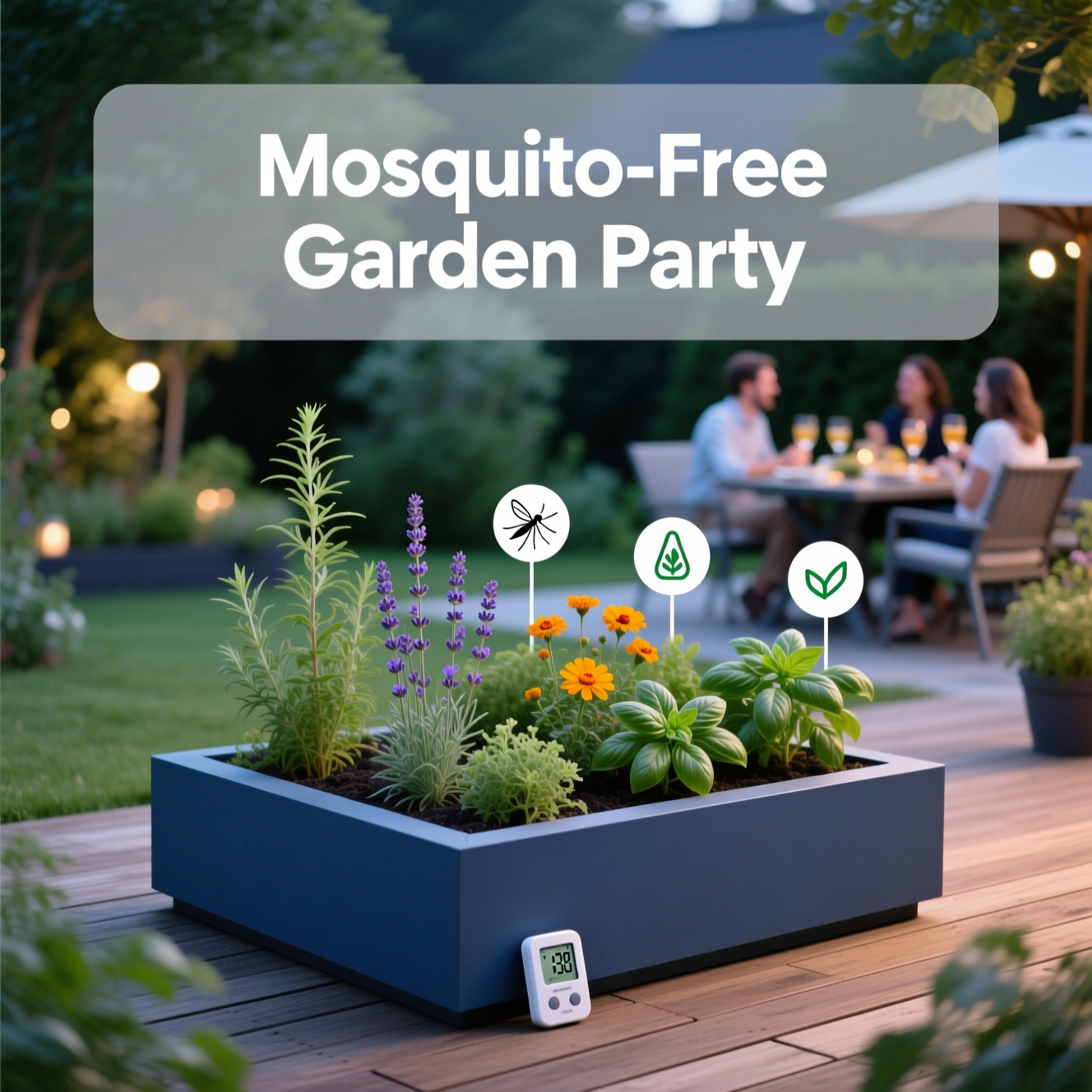What Are the Most Effective Natural Mosquito Repellents for a Garden Party?
For garden party pests, several natural mosquito repellent options offer effective outdoor insect control. Essential oils are a popular choice for deterring mosquitoes. Citronella, eucalyptus, lemon balm, lavender, and geranium are among the unique words that come to mind when considering natural solutions. These plants and their oils can create a pleasant aroma while repelling unwanted guests.
Studies demonstrate the efficacy of certain essential oils as DEET alternatives. For instance, citronella oil (Cymbopogon nardus) can provide protection for 30-60 minutes. Eucalyptus oil (Eucalyptus citriodora) is notably recognized for its repellent qualities. Specifically, the compound PMD (p-menthane-3,8-diol) found in lemon eucalyptus is highly effective. Certain essential oils can offer protection against mosquito bites for up to six hours, comparable to some synthetic repellents. This level of protection ensures a more enjoyable outdoor gathering.
How Can I Use Plants to Naturally Repel Mosquitoes from My Garden Party Area?
Employing aromatic plants strategically can naturally deter mosquitoes from garden party areas. This natural pest deterrent leverages the inherent properties of pest-deterring flora. Plants like citronella grass (Cymbopogon citratus) and lemon balm (Melissa officinalis) are well-known for their mosquito-repelling qualities. Marigolds (Tagetes spp.) also contribute to this natural defense, offering a vibrant visual appeal alongside their functional benefits.
These herbaceous perennials, including lavender (Lavandula angustifolia), contain natural compounds that mosquitoes find unappealing. Strategic planting near seating areas and entry points is key to maximizing efficacy. For most gardeners, denser planting of mosquito-repelling flowers and foliage creates a more robust aromatic barrier. A cluster of lavender plants can release a scent strong enough to deter mosquitoes within a 10-foot radius, offering a fragrant, natural solution for garden mosquito control.
What Are Effective Homemade Mosquito Repellent Recipes for Guests?
Creating effective homemade mosquito repellent offers a natural solution for guest comfort. A common DIY bug spray involves combining essential oils, such as citronella or peppermint, with a carrier. Witch hazel or a dilute rubbing alcohol solution, like 70% isopropyl alcohol, can serve as excellent bases for these natural insect repellent recipes.
For optimal results, aim for a concentration of 5-10% essential oil within the carrier base. This ratio is generally considered effective for providing temporary relief from insect bites. For a more potent tincture, consider an herbal infusion; steep dried aromatic herbs in your chosen carrier liquid for several weeks to maximize their repellent properties. This DIY repellent method ensures guests have a readily available option.
In practical terms, carefully blending these ingredients helps to disperse the active oils effectively. This approach prioritizes guest comfort with simple, accessible ingredients. Recent studies also highlight the efficacy of plant-derived compounds in natural insect repellent recipes.
How Can I Eliminate Mosquito Breeding Grounds Around My Garden Party Venue?
Effective backyard mosquito control hinges on preventing mosquito infestation. This means diligently addressing all sources of stagnant water. Mosquitoes require only a tablespoon of standing water to breed. Regularly emptying and cleaning common culprits like bird baths, clogged gutters, and plant saucers is a primary step for source reduction. Ensuring proper drainage in your yard prevents the accumulation of unwanted stagnant water, which is essential for eliminating mosquito breeding.
Recent studies highlight the urgency: a single female mosquito can lay up to 500 eggs at a time. This rapid reproduction cycle underscores the importance of eliminating even small water collections. For unavoidable water features or areas prone to pooling, employing Bti (Bacillus thuringiensis israelensis) larvicides offers a scientifically validated and environmentally sound solution. This targeted approach disrupts the mosquito life cycle before they become flying nuisances. Implementing these practices significantly contributes to long-term mosquito management and a more enjoyable outdoor space.
What Kind of Smells Naturally Repel Mosquitoes and Other Insects?
Mosquitoes and other insects rely on specific olfactory senses to locate hosts. They are notably attracted to carbon dioxide, lactic acid, and octenol. However, certain pungent scents can effectively disrupt these cues, providing natural repellency. These deterrent aromas often stem from plants releasing volatile organic compounds (VOCs) that interfere with insect detection. Understanding these scent profiles is key to odor-based pest control.
Modern experts recommend plants like citronella, peppermint, lemongrass, basil, rosemary, and catnip. These plants emit VOCs that can mask human attractants or directly irritate the insect’s sensory organs. For instance, the scent of catnip (Nepeta cataria) has demonstrated significant efficacy. Research indicates its active compound, nepetalactone, can be up to 10 times more effective than DEET in repelling mosquitoes in controlled environments, showcasing its potent natural deterrent properties.
Are Citronella Candles and Torches Truly Effective for Mosquito Repellent?
Many seek citronella candles and mosquito torches for outdoor party deterrents. These products aim for natural bug control. However, their burning efficacy is often limited. This creates a challenge for widespread mosquito repellent needs.
While citronella essential oils are released, their effect is localized. It typically extends only about 1-2 feet. Wind significantly diminishes this repellent radius. For practical application, multiple devices are beneficial. The effectiveness hinges on the actual citronella oil concentration within the fuel source. Studies show citronella candles can reduce landings by up to 40% in windless conditions. This statistic, however, drops sharply with air movement. Their contribution to outdoor ambiance is notable, but their mosquito repellent power is confined.
What Are the Best Natural Ways to Get Rid of Mosquitoes in a Yard for a Party?
Preparing for an outdoor party involves a comprehensive natural mosquito control strategy. Effective backyard pest management focuses on eliminating breeding sites and deterring adult mosquitoes. This integrated pest management approach ensures a more enjoyable outdoor event.
Implementing source reduction, such as eliminating standing water, can decrease yard mosquito populations by over 80%. Introducing mosquito-eating fish like Gambusia affinis to ponds offers biological control. For water features, Bti dunks provide a safe larvicide. Planting mosquito-repelling flora strategically can also contribute to a less hospitable environment for these pests.
For immediate protection, consider natural barrier sprays or outdoor essential oil diffusers. This multi-faceted approach ensures the most significant results for your outdoor party preparation. Yard sanitation, combined with these methods, enhances overall backyard pest management.

Tyler manages the physical testing of LEDs, pumps, and sensors. With a background in mechanical systems, he is the architect behind our ROI and Yield calculators, transforming complex hardware specs into actionable data for our readers.

